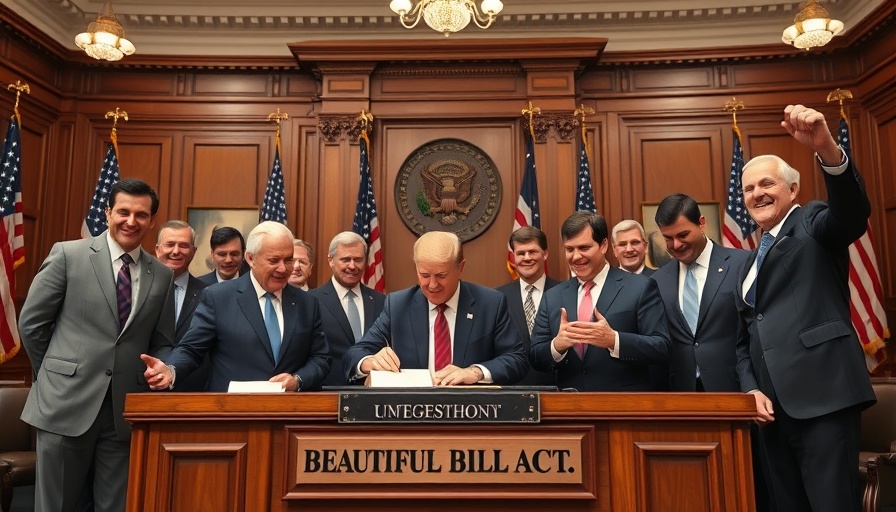
Understanding Trump’s GOP Megabill and Its Impacts on Texas
The recently passed GOP megabill, which carries significant components of former President Trump's domestic policy agenda, poses a potential upheaval for millions of Texans. After extensive negotiations, this sweeping legislation has not only reached Congress but is now set to become law, bringing with it substantial changes that could reshape health care, immigration, and financial policy across the state.
Major Changes to Health Care: What You Need to Know
One of the most alarming aspects of the megabill is its projected impact on health care coverage for Texans. Estimates suggest that over 300,000 individuals might lose their health insurance due to the Medicaid alterations set to commence in 2027. For a state already struggling with the highest uninsured rate in the nation, this change is particularly concerning.
Medicaid, which supports more than 4 million Texans, will see a potential funding cut of about $39 billion over the next decade. This is particularly detrimental in regions like the Rio Grande Valley and rural areas where many hospitals rely heavily on Medicaid funding. The forecasted drop in enrollment can also be attributed to new work requirements which will likely create barriers for many eligible participants, particularly those who may find it difficult to document their work status.
The Rising Cost of ACA Marketplace Coverage
The megabill's provisions will also affect the Affordable Care Act (ACA) marketplaces. While millions rely on these marketplaces for coverage, the bill introduces measures that could lead to increased difficulty in enrollment and the expiration of enhanced premium tax credits that help lower out-of-pocket costs. As Texas hasn't expanded Medicaid under the ACA, many residents are heavily reliant on these help-included tax credits, making the proposed changes a double blow.
Impact on Communities: A Closer Look
In regions heavily reliant on Medicaid funding, such as East Texas and the border towns, the anticipated cuts could have life-altering ramifications. It’s crucial to understand how these changes disproportionately affect low-income families and children. With nearly 5 million adults and children currently without health insurance in Texas, the protections offered by Medicaid and ACA programs are vital.
Moreover, the introduction of work requirements adds another layer of complexity. In states previously implementing similar requirements under Trump's first term, enrollment rates suffered significantly, particularly among eligible recipients navigating the complex documentation processes. As many low-income families scramble to keep their benefits amidst growing economic uncertainty, they also bear the burden of bureaucratic red tape.
The Broader Picture: Why This Matters Now
The stakes of this legislation extend beyond immediate health care concerns. It serves as a pivotal moment for Texas politics, aligning closely with ongoing debates around immigration reform, tax policy, and government welfare strategy. These discussions are amplified by ongoing crises at the southern border and with asylum seekers across the state. As legislation progresses, the Texas community must remain informed about these shifts and their implications.
What You Can Do
Staying informed about legislative changes is crucial, especially for those affected by health care policies. Engaging with local advocacy groups, monitoring developments in state policies, and voicing concerns to representatives can potentially influence positive outcomes. Texas residents are encouraged to remain proactive, using each opportunity to educate themselves and their community about how their government works and how policy changes will impact their lives.
In Conclusion
The GOP megabill represents a significant pivot in the health care landscape for Texas. With drastic changes on the horizon, it is essential for all Texans to understand these implications and remain vigilant in the face of legislative shifts that could transform daily life across the state. The time to act is now—knowledge is a powerful tool in ensuring fair representation in government.
 Add Element
Add Element  Add Row
Add Row 



Write A Comment